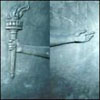
This Week: The Strokes survive the hype, Spiritualized rebuilds the wall of sound and Fugazi diversifies.
The Strokes
Is This It? (RCA)

Never before has a rock album posed such a loaded question and then left it open. After months of hype and gushing press, the Strokes' debut full-length lives up to its unimpressed title at first. Febrile claims that the New York-based quintet resurrect the shade-wearing shades of the Velvet Underground, Television, and other cool New York rock bands go unvalidated. The clipped and chugging guitars sometimes bear a resemblance, but the album's tinny, head-cold sonics sound cheap rather than edgy. Julian Casablancas mewls his lyrics like the kind of lead singer who lets the other guys in the band do all the flyering for shows. And as great as it is to hear good rock songs with no indie or pop-punk or mook-metal or No Depression tags hanging off of them once again, there isn't a truly great song in the bunch.
Spend a little time with Is This It?, though, and you start to realize that the album's overarching ambivalence isn't happenstance. From the weary, sing-song title track through the Pete Townshend update "Hard to Explain" to the album ending stormer "Take It or Leave It," the band's collective post-slacker shrugging and hedging starts to sound as valid as any other rock pose here in the early 21st-century. (It's even slyly funny now and then, as when Casblancas croons "Oh, my ex says I'm lacking in depth" on "Someday.")
Eventually those good-not-great songs start to sound like the sort of songs that would sound great live. It starts to occur that the Strokes might just be for real. And then you wonder, is there more?
—Lee Gardner
Spiritualized
Let It Come Down (Arista)

Spiritualized isn't really a band so much as a vehicle for conveying the monstrous sound and fury in Jason Pierce's famously substance-addled head. He writes warm psychedelic pop songs and rollicking blues rockers and then wraps them in thick layers of orchestration, great billowing waves of strum and clang and sha-la-la.
The new album, the first since 1997's Ladies and Gentlemen We Are Floating in Space, is full of the kind of hazy insights that seem like keys to the universe when you're out of your mind at 3 a.m., but sound like bumper stickers in the morning: "They say that out of sight is out of mind/But I think out of mind is out of sight"; "If I'm good for nothing, then nothing is good enough for me." Pierce, a.k.a. Jason Spaceman, gets away with it, because he always sounds like he's still in some other dimension—he's passing on revelations directly from the phantasmagoric realms.
But lyrics are the least of Let It Come Down's achievements. Even more than Ladies and Gentlemen, this is first and foremost a sonic experience. It sounds good at normal volumes, but it sounds great loud. Pierce is hardly the only knob-twiddler to aspire to Phil Spector's Wall of Sound mantle, but he's one of the few to get it right. He assembles massive armies of guitars, pianos, strings, drums, cymbals, police sirens, horn sections the size of Montana. Like Spector (and unlike George Martin and the many prog-rockers who came after), Pierce doesn't try to make rock 'n' roll symphonic—he makes the symphony play rock 'n' roll. He keeps his melodies big and bold, using the assembled talent (more than 100 musicians play on the album) not for nuance but muscle.
What makes it all work is the ebb and flow, the way songs can start disarmingly gentle and tender ("Out of Sight," "Stop Your Crying") and build into swooning anthems. The last track is a heartfelt hymn called "Lord Can You Hear Me." With this much joyful noise, Pierce probably doesn't have to worry about that.
—Jesse Fox Mayshark
Fugazi
The Argument (Dischord)

Fugazi has always been easy to mock and dismiss. As admirable as their politics and integrity may be, the band takes itself so seriously, that unless you relate to and buy into their worldview, you're likely to view them as preachy and didactic.
But such critiques have themselves oversimplified the band, missed the subtleties and progression of its music. Nowhere is Fugazi's depth more evident than on The Argument.
Lead singer and guitarist Ian Mackaye varies from his trademark scream frequently. On "Nightshop" he starts with a defiant whisper "f*** your f***ed directives." Two minutes into the song, the guitars kick in high notch, as Mackaye's voice grows in fierceness, and just when you think the song might give way to raging guitars and yowls, it breaks into one of the sweetest melodies Fugazi has ever composed.
The songs, too, are less overtly political. But even when you can't quite decipher the lyrics, there's something moralistic about it all. My biggest problem with Fugazi is that they never seem to enjoy themselves. There's an undeniable passion and righteousness in their music, but unlike another band that oozed righteousness—The Clash—Fugazi doesn't seem to know how to have fun.
The group has always viewed themselves as dissidents, in opposition to the culture at large. The final song, "The Argument," is a clear statement of purpose. Mackaye declares simply, "When people are catching what bombers release/ I'm on a mission to never agree/ Here comes the argument..." Then returns the old screaming. And even if you choose to argue back, it's hard not to admire Fugazi's refusal to waver from its ideals.
—Joe Tarr

November 1, 2001 * Vol. 11, No. 44
© 2001 Metro Pulse
|